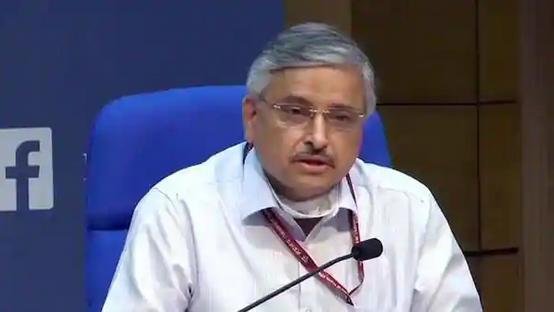
Rising R-Value concerning, containment strategies must: AIIMS chief

All India Institute of Medical Sciences (AIIMS) chief Dr Randeep Guleria has expressed concern over the rising ‘R Value’ of COVID-19 and has suggested ramping up containment strategies in states which have witnessed a recent surge in infections.
R Value or R-naught (R0) is the effective reproductive number of a virus, or in plain words the number of people an infected individual will transmit the disease to. The value is used by epidemiologists to gauge the movement of a particular virus in a geographical area over a period of time.
The R-Value of COVID-19 was recorded at 1.37 between March 9 and April 21, when the second wave of the pandemic was its peak. It dropped to 1.18 between April 24 and May 1 and further to 1.1 between April 29 and May 7.
“Starting from .96, and going all the way up to 1, the rise in R-Value is a cause of concern. Simply put, this means that the chances of infection spreading from a person, who has COVID, to others have gone up. The areas which are witnessing this surge should bring in restrictions and employ “test, track, and treat” strategy to break the chain of transmission,” Dr Guleria told NDTV on Saturday.
Also read: 46 districts with more than 10% positivity rate: Centre warns states
A recent report by the Centres for Disease Control and Prevention (CDC), the US health authority, recently said that the Delta variant of COVID-19 can cause severe illnesses and is as infectious as chickenpox.
“Measles or chickenpox used to have R factor of 8 or more, which means one persom could infect eight others. That sort of suggests that this virus is highly infectious. We saw that in our second wave, because whole families were getting infected. This happens with chicken pox also. In a similar manner, when one person has Delta variant, the whole family is vulnerable,” he said.
India on Friday recorded 44,420 fresh infections, the highest in three weeks. A bulk of the infections was contributed by Kerala, Karnataka and northeastern states. Kerala, which has an R-Value of 1.11 accounts for almost 50 per cent of the country’s cases.
Pointing to the surge, Guleria said, given the fact that Kerala has shown an efficient COVID management in the past, it is imperative to evaluate the recent surge in infections in the state and find out if a variant is causing it.
“In the beginning, Kerala had set a precedent for others by managing the pandemic well. They also had an aggressive vaccination drive. Yet despite that, are witnessing a spike in a way that’s different from other parts of the country. This needs to be evaluated. Also, is there a variant behind the surge? Are containment strategies being aggressively followed – all this needs to be evaluated,” he said.
Dr Guleria also suggested aggressive testing strategies for the neighbouring states of Karnataka and Tamil Nadu to break the chain of transmission.
Even though a sero-survey found 66 per cent of Tamil Nadu residents to have developed antibodies against COVID-19, the state has still witnessed an increase in case.
Dr Guleria sero-surveys are not indicators of herd immunity.
Also read: Delta variant more severe, as infectious as chickenpox, says report
“In Brazil, similar survey from a city showed 70 per cent of population had herd immunity. Yet we had a huge outbreak. We really don’t know what’s the cut off in such cases, and also the antibodies gradually decrease over a period of time. It, however, shows that the chances of serious infections are lesser. For instance in Kerala, and UK, people are getting the infection, they may be spreading but they are not getting serious infection,” he said.

